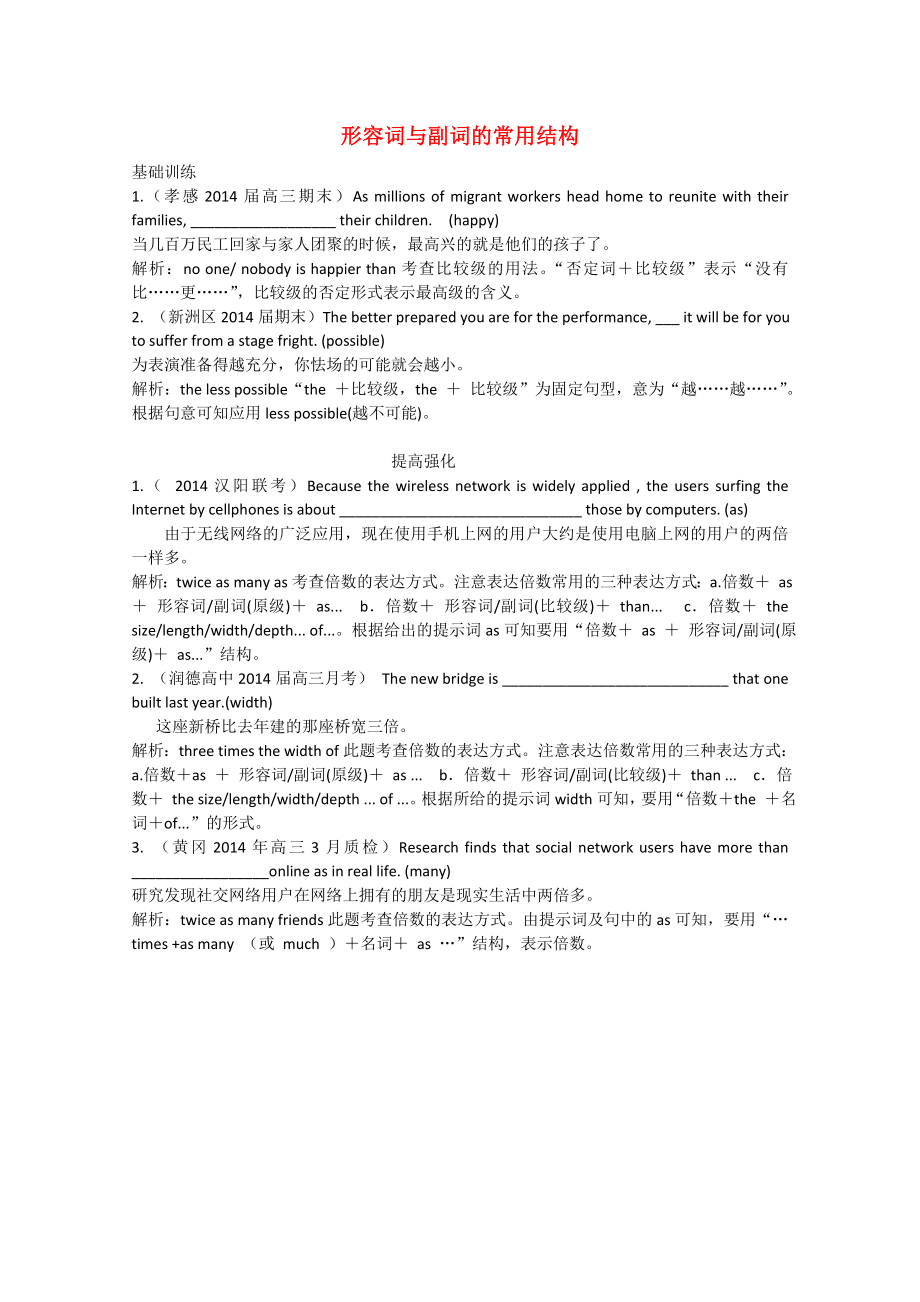《(湖北專(zhuān)版)2015屆高三英語(yǔ)總復(fù)習(xí)配套專(zhuān)題練習(xí) 形容詞與副詞》由會(huì)員分享�����,可在線閱讀����,更多相關(guān)《(湖北專(zhuān)版)2015屆高三英語(yǔ)總復(fù)習(xí)配套專(zhuān)題練習(xí) 形容詞與副詞(1頁(yè)珍藏版)》請(qǐng)?jiān)谘b配圖網(wǎng)上搜索�����。
1�����、形容詞與副詞的常用結(jié)構(gòu)
基礎(chǔ)訓(xùn)練
1.(孝感2014屆高三期末)As millions of migrant workers head home to reunite with their families, __________________ their children. (happy)
當(dāng)幾百萬(wàn)民工回家與家人團(tuán)聚的時(shí)候���,最高興的就是他們的孩子了���。
解析:no one/ nobody is happier than考查比較級(jí)的用法�?��!胺穸ㄔ~+比較級(jí)”表示“沒(méi)有比……更……”�,比較級(jí)的否定形式表示最高級(jí)的含義�����。
2. (新洲區(qū)2014屆期末)The better prepare
2�、d you are for the performance, ___ it will be for you to suffer from a stage fright. (possible)
為表演準(zhǔn)備得越充分,你怯場(chǎng)的可能就會(huì)越小����。
解析:the less possible“the +比較級(jí),the + 比較級(jí)”為固定句型�����,意為“越……越……”���。根據(jù)句意可知應(yīng)用less possible(越不可能)���。
提高強(qiáng)化
1.( 2014漢陽(yáng)聯(lián)考)Because the wireless network is widely
3�����、applied , the users surfing the Internet by cellphones is about ______________________________ those by computers. (as)
由于無(wú)線網(wǎng)絡(luò)的廣泛應(yīng)用���,現(xiàn)在使用手機(jī)上網(wǎng)的用戶(hù)大約是使用電腦上網(wǎng)的用戶(hù)的兩倍一樣多。
解析:twice as many as考查倍數(shù)的表達(dá)方式�����。注意表達(dá)倍數(shù)常用的三種表達(dá)方式:a.倍數(shù)+ as + 形容詞/副詞(原級(jí))+ as... b.倍數(shù)+ 形容詞/副詞(比較級(jí))+ than... c.倍數(shù)+ the size/length/width/d
4�、epth... of...����。根據(jù)給出的提示詞as可知要用“倍數(shù)+ as + 形容詞/副詞(原級(jí))+ as...”結(jié)構(gòu)。
2. (潤(rùn)德高中2014屆高三月考) The new bridge is ____________________________ that one built last year.(width)
這座新橋比去年建的那座橋?qū)捜丁?
解析:three times the width of此題考查倍數(shù)的表達(dá)方式����。注意表達(dá)倍數(shù)常用的三種表達(dá)方式:a.倍數(shù)+as + 形容詞/副詞(原級(jí))+ as ... b.倍數(shù)+ 形容詞/副詞(比較級(jí))+ than ... c.倍數(shù)+
5、the size/length/width/depth ... of ...�。根據(jù)所給的提示詞width可知,要用“倍數(shù)+the +名詞+of...”的形式。
3. (黃岡2014年高三3月質(zhì)檢)Research finds that social network users have more than _________________online as in real life. (many)
研究發(fā)現(xiàn)社交網(wǎng)絡(luò)用戶(hù)在網(wǎng)絡(luò)上擁有的朋友是現(xiàn)實(shí)生活中兩倍多��。
解析:twice as many friends此題考查倍數(shù)的表達(dá)方式�。由提示詞及句中的as可知,要用“… times +as many (或 much )+名詞+ as …”結(jié)構(gòu)�,表示倍數(shù)。
 (湖北專(zhuān)版)2015屆高三英語(yǔ)總復(fù)習(xí)配套專(zhuān)題練習(xí) 形容詞與副詞
(湖北專(zhuān)版)2015屆高三英語(yǔ)總復(fù)習(xí)配套專(zhuān)題練習(xí) 形容詞與副詞
